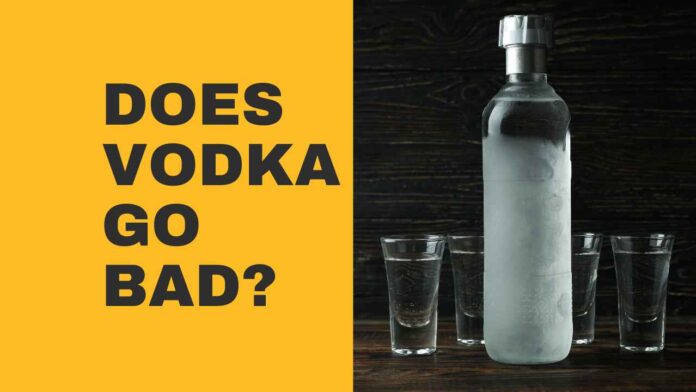This page may contain affiliate links. Please see our Disclaimer for more information. Always drink responsibly and adhere to your local legal drinking age.
We’ve all asked ourselves the same question at one time or another: Does vodka go bad? After all, it’s not like you can smell or taste if it’s gone bad—so how are you supposed to know? Well, the answer might surprise you!
We’re here to answer your questions and put your mind at ease. If you’ve ever wondered whether that half-full bottle of vodka in your liquor cabinet is still drinkable, this article is for you! Keep reading to learn more about how long vodka lasts and what signs indicate that yours has gone bad.
Does Vodka Go Bad, and Why?
The short answer is yes; vodka does go bad. However, it’s important to note that vodka doesn’t spoil or rot like other foods or drinks. Instead, as a distilled spirit, it will slowly lose its flavor and aroma over time—with too much exposure to air, sunlight, and temperature changes. That’s why you might notice a difference in taste if you’ve had the bottle open for over a few months.
So why? Vodka’s alcoholic content typically ranges from 30-50%; the higher the alcohol content, the slower its oxidation rate. This means that oxidization isn’t as much of an issue for vodkas with higher alcohol content.
However, lower alcohol-content vodkas are more vulnerable to exposure to air and sunlight over time, leading to a gradual loss of flavor and aroma. Furthermore, any temperature changes can cause condensation on the cap or lid of your vodka bottle, which, if left unattended for too long, can also lead to oxidation.
Put: If your vodka is stored optimally (in cool temperatures away from light), it should last indefinitely, so keep it tightly and stored properly!
What Is Vodka?
Let’s back up momentarily and get some basics out of the way. What is vodka, exactly? Well, it’s a clear spirit—like rum, whiskey, or gin—made from grains or potatoes. The differences between these spirits really come down to the types of grains or potatoes used to make them. Vodka is made by continuously distilling fermented grains or potatoes until the liquid reaches 40% alcohol (80 proof) to preserve its flavor.
In other words, its flavor can be distilled into pure alcohol. This means it doesn’t have a lot of additional aromas, flavors, or color—which also makes it an ideal liquor for mixing drinks like martinis or vodka tonics.
So with all that said, let’s dive back into our original question: Does vodka go bad?
Will Open Bottle of Vodka Go Bad?
You may be wondering, does an open bottle of vodka go bad? Well, the answer might surprise you. The good news is that an open bottle of vodka typically won’t go bad.
Vodka contains 40% alcohol, enough to preserve it for a long time, even after opening it. As long as it’s kept out of direct sunlight and away from heat sources, your open bottle of vodka should last indefinitely – provided it doesn’t evaporate first!
Oxidation is the only thing to watch out for with an open bottle of vodka. Oxidation occurs when air enters the bottle and interacts with the ethanol in the vodka, causing off-flavors and a general decline in quality.
To avoid oxidation of your open bottle of vodka, keep it tightly sealed after each use and fill it to the top when you can. This will help minimize the air in your bottle and keep your vodka tasting great for as long as possible!
Will Unopened Bottle of Vodka Go Bad?
If you’re wondering if unopened bottles of vodka can go bad, the answer might surprise you. The truth is vodka will not go bad. That being said, a few things could happen to your bottle of vodka over time.
Smell and taste change
The longer you leave an unopened bottle of vodka alone, the more its taste and smell may change. This happens because vodka is a distilled spirit that slowly evaporates over time. So while it’s unlikely that stored vodka will turn sour as wine can, it will slowly lose its flavor and potency.
Color change
When left long enough, some vodkas may also darken in color. This is due to the natural aging process that occurs with all spirits and is similar to that of aging whisky or whiskey in oak barrels.
But other than these minor changes, an unopened bottle of vodka won’t go bad or expire, so you don’t have to worry about throwing any away unless there’s something seriously wrong with your bottle—like a big crack or something obvious like that!
How to Tell if Vodka Has Gone Bad?
If you’re wondering how to tell if your vodka has gone bad, there are a few things you should look out for. First of all, like other alcoholic beverages, vodka can oxidize and lose much of its flavor over time—so if your vodka tastes flat or different than it normally does, that could be a sign that it’s going bad.
Secondly, you’ll want to check for any separation of the liquid or cloudy particles in the liquid. This can occur when the ethanol in vodkas begins to oxidize over time. If this happens, you may smell an unpleasant odor from the bottle.
Finally, if your vodka has been stored somewhere warm or exposed to sunlight for too long, it can cause oxidation and spoilage. If this has been done, the alcohol content of your vodka may be lower than usual and could have an unpleasant aroma or taste due to oxidation.
To ensure your vodka is still safe to consume, always check for any signs of spoilage before using it in cocktails or drinks!
How to Store Vodka to Make It Last Longer
You may be wondering how to store your bottle of vodka if you want it to last as long as possible.
Here are some tips for storing vodka:
- Store it at room temperature, around 70°F. If the vodka gets too cold, it will become cloudy and could damage the structure of the alcohol molecules.
- Ensure it is stored in a dry place, free from direct sunlight and away from any heat sources.
- Keep the bottle tightly sealed when not in use to prevent oxidation, as oxygen will break down the alcohol molecules over time and decrease its shelf life.
- Store the vodka upright rather than laying it down, as this could prevent leakage or evaporation of alcohol over time.
Following these storage tips can help ensure that your bottle of vodka lasts longer and tastes great when you’re ready to pour yourself a drink!
Different Types of Vodka and Shelf Life Expectations
You might be surprised to learn that different types of vodka have different shelf lives, too. Here’s what you need to know about the shelf life of various forms of vodka:
Unopened Bottles
Unopened bottles of vodka typically last for about five years if stored away from heat and light. Remember that the more expensive brands may sometimes last even longer—up to eight or nine years.
Opened Bottles
Open bottles last a shorter time than unopened ones—generally just a few months. It’s best to store opened bottles from direct sunlight and finish them within two months for the best results.
Flavored Vodka
Due to the added ingredients in flavored vodka, it typically has a shorter shelf life than traditional vodka—just three to six months after it’s been opened. Check best-before dates on flavored vodkas and opt for fresh batches whenever possible.
The bottom line is this: Unless you’re drinking your vodka regularly and drinking it quickly after opening, you can expect it to last several years without spoiling if stored properly according to manufacturer instructions.
Does Vodka Expire?
Yes, even vodka can expire! But don’t worry—it won’t go as bad as other food and drinks, so you don’t have to worry about rotting or growing moldy.
The main reason vodka can expire is because of oxidation. Over time, the molecules in alcoholic beverages start to break down and react with oxygen, changing their taste and smell. This reaction causes the liquor flavors to change, often becoming more acidic or bitter. Because vodka is usually clear and doesn’t contain many added flavors like some other liquors, it’s more susceptible to oxidation than other types of alcohol.
So if you’re wondering whether you should go out and buy a new bottle of vodka because your old one has been sitting around for a few years—the answer is probably yes! Your best bet is to pay attention to the expiration date printed on the bottle and replace it when that date passes.
FAQ
You might be wondering if you should know any other questions about vodka going bad. Let’s look at some commonly asked questions (FAQs) about this topic.
Is It Okay for Vodka to Go Cloudy?
It’s actually common for vodka to become cloudy when chilled. This is because the alcohol in the vodka can bond with impurities and particles in the air, and this bonding process makes the liquid cloud up. So don’t worry if your vodka turns cloudy when it gets cold—it’s totally normal.
How Long Does It Take for Vodka to Expire?
Vodka doesn’t technically expire, but its flavor can change over time and become less desirable as it ages. That said, you should try to consume it within two years of opening it—unless it has a specific expiration date on the bottle.
Is It Normal for Vodka to Have Sediment in It?
No, sediment isn’t normal for vodka—it usually indicates that it might be old or expired. If you find sediment in a bottle of vodka, avoid drinking it and buy a new one instead!
Conclusion
In conclusion, the answer to the question, ‘does vodka go bad?’ depends on several factors. Unopened bottles of vodka can last for years without any deterioration in flavor.
However, once you open them, you should try to use them within a year, if not sooner. Once opened, vodka can still be used for several years if stored properly and away from direct sunlight. The effects of oxidation and contamination can cause vodka to spoil and become undrinkable. Keeping vodka in a cool, dry place can help ensure it remains drinkable and doesn’t go bad.
In any case, use your nose and taste as a guide to determine whether vodka has gone bad.
Keep Reading
How Much Does a Handle of Vodka Cost? (2023 Price Guide)
How Much is a Handle of Tito’s Vodka? (2023 Price Guide)
What Proof Is Grey Goose Vodka? Comprehensive Guide



















